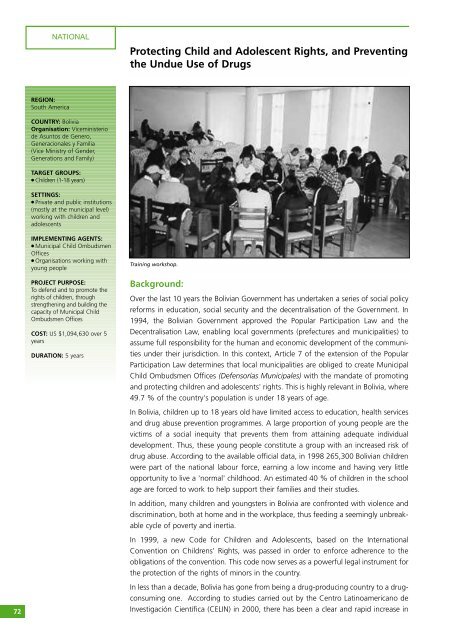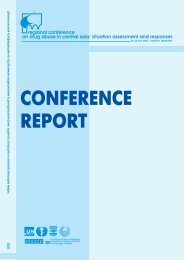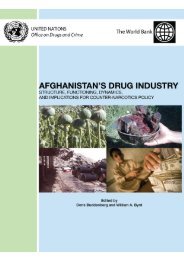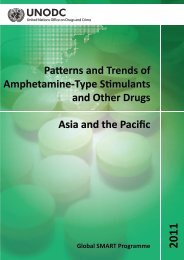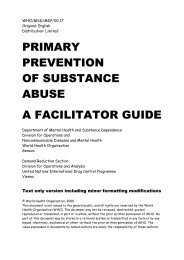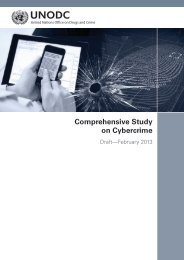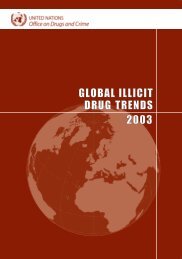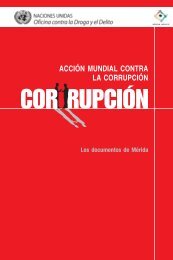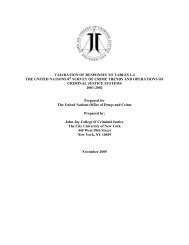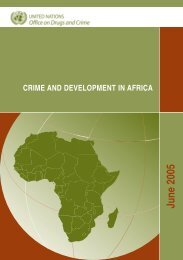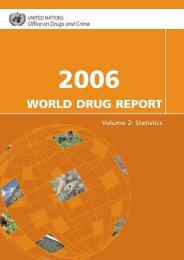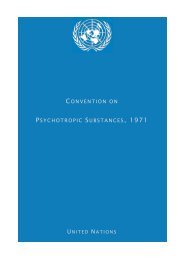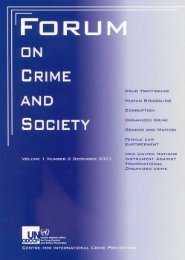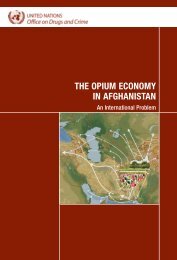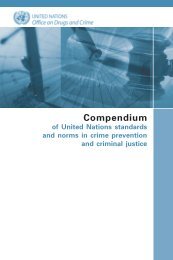PDF (Lessons learned in drug abuse prevention: a global review)
PDF (Lessons learned in drug abuse prevention: a global review)
PDF (Lessons learned in drug abuse prevention: a global review)
Create successful ePaper yourself
Turn your PDF publications into a flip-book with our unique Google optimized e-Paper software.
NATIONAL<br />
Protect<strong>in</strong>g Child and Adolescent Rights, and Prevent<strong>in</strong>g<br />
the Undue Use of Drugs<br />
REGION:<br />
South America<br />
COUNTRY: Bolivia<br />
Organisation: Vicem<strong>in</strong>isterio<br />
de Asuntos de Genero,<br />
Generacionales y Familia<br />
(Vice M<strong>in</strong>istry of Gender,<br />
Generations and Family)<br />
TARGET GROUPS:<br />
● Children (1-18 years)<br />
SETTINGS:<br />
● Private and public <strong>in</strong>stitutions<br />
(mostly at the municipal level)<br />
work<strong>in</strong>g with children and<br />
adolescents<br />
72<br />
IMPLEMENTING AGENTS:<br />
● Municipal Child Ombudsmen<br />
Offices<br />
● Organisations work<strong>in</strong>g with<br />
young people<br />
PROJECT PURPOSE:<br />
To defend and to promote the<br />
rights of children, through<br />
strengthen<strong>in</strong>g and build<strong>in</strong>g the<br />
capacity of Municipal Child<br />
Ombudsmen Offices<br />
COST: US $1,094,630 over 5<br />
years<br />
DURATION: 5 years<br />
Tra<strong>in</strong><strong>in</strong>g workshop.<br />
Background:<br />
Over the last 10 years the Bolivian Government has undertaken a series of social policy<br />
reforms <strong>in</strong> education, social security and the decentralisation of the Government. In<br />
1994, the Bolivian Government approved the Popular Participation Law and the<br />
Decentralisation Law, enabl<strong>in</strong>g local governments (prefectures and municipalities) to<br />
assume full responsibility for the human and economic development of the communities<br />
under their jurisdiction. In this context, Article 7 of the extension of the Popular<br />
Participation Law determ<strong>in</strong>es that local municipalities are obliged to create Municipal<br />
Child Ombudsmen Offices (Defensorías Municipales) with the mandate of promot<strong>in</strong>g<br />
and protect<strong>in</strong>g children and adolescents' rights. This is highly relevant <strong>in</strong> Bolivia, where<br />
49.7 % of the country's population is under 18 years of age.<br />
In Bolivia, children up to 18 years old have limited access to education, health services<br />
and <strong>drug</strong> <strong>abuse</strong> <strong>prevention</strong> programmes. A large proportion of young people are the<br />
victims of a social <strong>in</strong>equity that prevents them from atta<strong>in</strong><strong>in</strong>g adequate <strong>in</strong>dividual<br />
development. Thus, these young people constitute a group with an <strong>in</strong>creased risk of<br />
<strong>drug</strong> <strong>abuse</strong>. Accord<strong>in</strong>g to the available official data, <strong>in</strong> 1998 265,300 Bolivian children<br />
were part of the national labour force, earn<strong>in</strong>g a low <strong>in</strong>come and hav<strong>in</strong>g very little<br />
opportunity to live a 'normal' childhood. An estimated 40 % of children <strong>in</strong> the school<br />
age are forced to work to help support their families and their studies.<br />
In addition, many children and youngsters <strong>in</strong> Bolivia are confronted with violence and<br />
discrim<strong>in</strong>ation, both at home and <strong>in</strong> the workplace, thus feed<strong>in</strong>g a seem<strong>in</strong>gly unbreakable<br />
cycle of poverty and <strong>in</strong>ertia.<br />
In 1999, a new Code for Children and Adolescents, based on the International<br />
Convention on Childrens’ Rights, was passed <strong>in</strong> order to enforce adherence to the<br />
obligations of the convention. This code now serves as a powerful legal <strong>in</strong>strument for<br />
the protection of the rights of m<strong>in</strong>ors <strong>in</strong> the country.<br />
In less than a decade, Bolivia has gone from be<strong>in</strong>g a <strong>drug</strong>-produc<strong>in</strong>g country to a <strong>drug</strong>consum<strong>in</strong>g<br />
one. Accord<strong>in</strong>g to studies carried out by the Centro Lat<strong>in</strong>oamericano de<br />
Investigación Científica (CELIN) <strong>in</strong> 2000, there has been a clear and rapid <strong>in</strong>crease <strong>in</strong>


